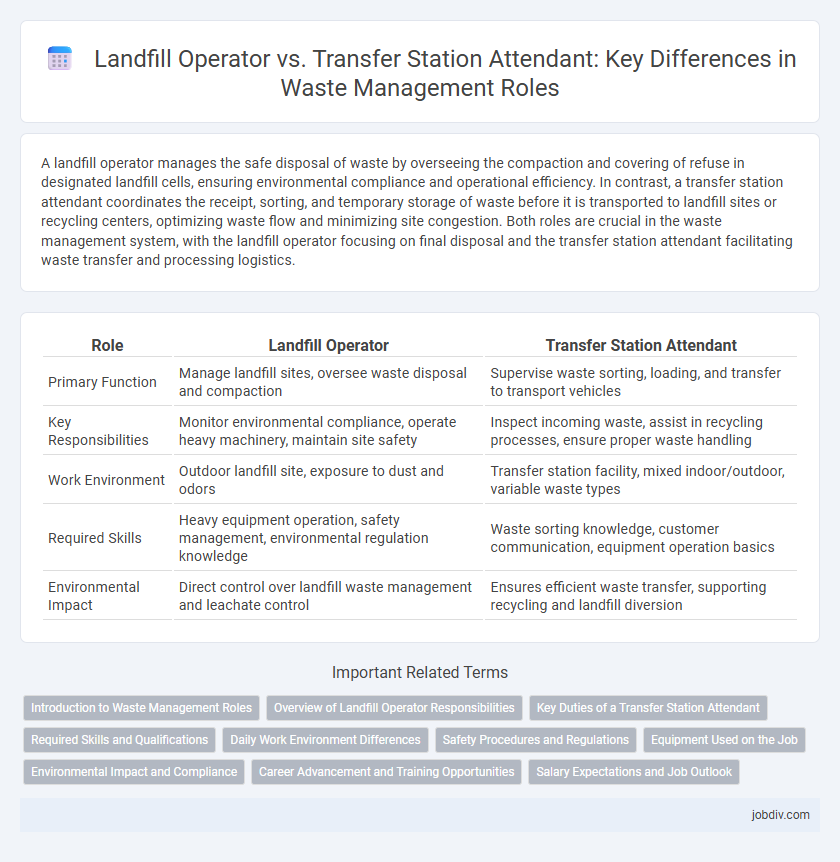A landfill operator manages the safe disposal of waste by overseeing the compaction and covering of refuse in designated landfill cells, ensuring environmental compliance and operational efficiency. In contrast, a transfer station attendant coordinates the receipt, sorting, and temporary storage of waste before it is transported to landfill sites or recycling centers, optimizing waste flow and minimizing site congestion. Both roles are crucial in the waste management system, with the landfill operator focusing on final disposal and the transfer station attendant facilitating waste transfer and processing logistics.
Table of Comparison
| Role | Landfill Operator | Transfer Station Attendant |
|---|---|---|
| Primary Function | Manage landfill sites, oversee waste disposal and compaction | Supervise waste sorting, loading, and transfer to transport vehicles |
| Key Responsibilities | Monitor environmental compliance, operate heavy machinery, maintain site safety | Inspect incoming waste, assist in recycling processes, ensure proper waste handling |
| Work Environment | Outdoor landfill site, exposure to dust and odors | Transfer station facility, mixed indoor/outdoor, variable waste types |
| Required Skills | Heavy equipment operation, safety management, environmental regulation knowledge | Waste sorting knowledge, customer communication, equipment operation basics |
| Environmental Impact | Direct control over landfill waste management and leachate control | Ensures efficient waste transfer, supporting recycling and landfill diversion |
Introduction to Waste Management Roles
Landfill operators manage waste disposal sites by overseeing the safe burial of refuse, ensuring compliance with environmental regulations, and maintaining equipment and site conditions. Transfer station attendants coordinate the temporary collection and consolidation of waste before transportation to final disposal, optimizing logistics and preventing overflow at landfill sites. Both roles are crucial in the waste management process, contributing to efficient, sustainable handling of solid waste materials.
Overview of Landfill Operator Responsibilities
Landfill operators manage waste disposal by overseeing the daily operation and maintenance of landfill sites, ensuring proper waste segregation, compaction, and environmental compliance. They monitor gas emissions, manage leachate treatment systems, and implement safety protocols to prevent contamination and hazards. Operators also coordinate with environmental agencies and maintain records for regulatory reporting and site inspections.
Key Duties of a Transfer Station Attendant
Transfer Station Attendants primarily manage the intake, sorting, and temporary storage of waste before it is transported to landfills or recycling facilities, ensuring proper segregation of recyclable and non-recyclable materials. They operate heavy machinery, maintain accurate records of incoming waste volumes, and enforce safety protocols to minimize environmental impact and worker hazards. Unlike Landfill Operators who manage long-term waste disposal and site maintenance, Transfer Station Attendants focus on efficient waste transfer processes and customer service at collection points.
Required Skills and Qualifications
Landfill operators must possess knowledge of waste management regulations, heavy equipment operation, and environmental safety protocols to effectively manage landfill sites and ensure compliance. Transfer station attendants require strong organizational skills, proficiency in waste sorting and handling, and basic equipment operation to facilitate efficient waste transfer and minimize contamination. Both roles demand physical stamina, attention to detail, and adherence to safety standards to maintain operational efficiency and environmental protection.
Daily Work Environment Differences
Landfill operators manage large-scale waste disposal sites, working outdoors amid heavy machinery and decomposing materials, often facing exposure to odors, dust, and fluctuating weather conditions. Transfer station attendants operate in more controlled environments, sorting and temporarily storing waste before transport, typically working indoors or under shelter with less direct exposure to environmental elements. Safety protocols differ as landfill operators handle higher-risk machinery and landfill gases, while transfer station attendants focus on efficient waste sorting and equipment operation in a relatively contained setting.
Safety Procedures and Regulations
Landfill operators follow strict safety procedures including monitoring methane gas levels, heavy machinery operation protocols, and waste compaction regulations to prevent accidents and environmental hazards. Transfer station attendants comply with regulations on waste sorting, hazardous material handling, and personal protective equipment (PPE) use to minimize exposure to harmful substances and ensure safe transfer of waste. Both roles require adherence to Occupational Safety and Health Administration (OSHA) standards and regular safety training to maintain a secure work environment.
Equipment Used on the Job
Landfill operators primarily use heavy machinery such as bulldozers, compactors, and excavators to manage waste disposal and maintain landfill sites. Transfer station attendants operate equipment including conveyor belts, loaders, and balers to facilitate the sorting, temporary storage, and transportation of waste materials. Both roles require proficiency in handling specialized machinery to ensure efficient and safe waste processing.
Environmental Impact and Compliance
Landfill operators manage waste disposal sites, ensuring proper containment to minimize soil and groundwater contamination while adhering strictly to EPA regulations. Transfer station attendants facilitate the efficient transfer of waste to larger transport vehicles, reducing vehicle emissions and optimizing route logistics to lower carbon footprints. Both roles maintain compliance with environmental standards, but landfill operators have a more direct impact on long-term environmental safety through leachate and methane management.
Career Advancement and Training Opportunities
Landfill Operators typically require specialized training in waste management regulations, equipment operation, and environmental safety, offering clear pathways to supervisory roles and certification advancements. Transfer Station Attendants often receive foundational training in sorting procedures and customer service, with fewer immediate opportunities for technical skill development or career progression. Career advancement for Landfill Operators is generally faster due to the complexity of duties and regulatory compliance demands.
Salary Expectations and Job Outlook
Landfill operators earn an average salary ranging from $40,000 to $60,000 annually, reflecting their responsibility for managing waste disposal sites and ensuring environmental compliance. Transfer station attendants typically earn between $30,000 and $45,000, overseeing the temporary storage and sorting of waste before transport to final disposal. The job outlook for landfill operators shows moderate growth due to increasing waste management regulations, while transfer station attendants face stable demand driven by urban waste processing needs.
Landfill Operator vs Transfer Station Attendant Infographic

 jobdiv.com
jobdiv.com